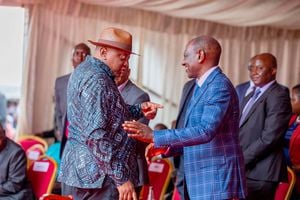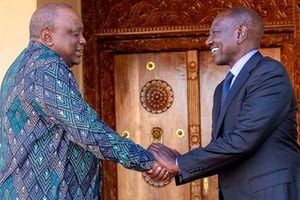
The political paths of President William Ruto, former president Uhuru Kenyatta and former deputy president Rigathi Gachagua converged at some point, becoming cosy for a season before souring as divergent political ambitions overrode all else.
The story of the political relationship between President William Ruto, his predecessor Uhuru Kenyatta and ousted Deputy President Rigathi Gachagua reads like a manual on how to effectively use and dump – with all the twists and turns in between.
The trio's political paths converged at some point, becoming cosy for a season before souring as divergent political ambitions overrode all else.
Mr Gachagua had been Uhuru Kenyatta's personal assistant since 1998, and both weathered various allegations in the run-up to the 2002 general election, including that Mr Kenyatta's first – and ultimately unsuccessful – attempt to become president was backed by the banned Mungiki sect. Both denied the allegations.
In that failed presidential bid, Mr Ruto and Mr Gachagua were his strongest pillars and they failed, conceded and licked their wounds together.
"But some saw birds of the same feather flocking as a sinister twist in the relationship between the three politicians when despite going different ways in the 2007 election, Mr Kenyatta and Mr Ruto ended up at the International Criminal Court (ICC) as crimes against humanity suspects," says former Gatanga MP Nduati Ngugi, referring to the Kenyan cases in The Hague linked to the post-election violence that followed President Mwai Kibaki’s disputed victory.
Mr Ngugi recalls that although Mr Kenyatta was then the leader of the opposition, he withdrew from the 2007 general election, a decision that Mr Gachagua publicly supported, and instead backed Mr Kibaki of the PNU. Mr Ruto, on the other hand, supported Mr Raila Odinga of the ODM.
When Kenyans' temporary moment of madness erupted in December 2007 and ended with a ceasefire on February 28, 2008, more than 1,000 people had lost their lives, hundreds of thousands had been displaced, many injured and property destroyed.
Mediators led by Kofi Annan came in and cobbled together a power-sharing deal with Mr Kibaki as president and Mr Kenyatta as prime minister in the grand coalition government. Mr Kenyatta, whose PA was still Mr Gachagua, became deputy prime minister from the Kibaki side, while Mr Ruto became a senior minister from the Odinga camp in the 2008 deal.
Three years later, fate would bring Mr Kenyatta and Mr Ruto together after they, along with four other Kenyans, were indicted by the International Criminal Court (ICC) for their alleged involvement in the post-election violence.
They denied the charges and would be acquitted years later, but the legal challenge would have political ramifications that began in 2013 but whose effects are still being felt today.
Against all odds, Mr Kenyatta and his running mate Mr Ruto won the presidency to succeed Mr Kibaki against a ticket led by Mr Odinga. They became the dynamic Uhuru-Ruto pair, politically joined at the hip and publicly displaying signs of what appeared to be genuine friendship. Mr Gachagua was not given a senior position at the time, but remained one of Mr Kenyatta's most trusted aides.
By the time the seemingly inseparable UhuRuto Jubilee Party ticket won re-election in 2017 – through a rerun election in October after the first one in August was annulled – Mr Gachagua had also come of age, becoming the MP for Mathira in Nyeri County at the first attempt.
Then there was trouble in paradise. First, there were murmurs, then loud public exchanges that split UhuRuto into two squabbling camps in the same house. A crucial act that deepened the divisions was the 2018 handshake between Mr Kenyatta and his bitter opponent, Mr Odinga.
Mr David Murathe, a close ally of Mr Kenyatta, says "political, economic and social incompatibilities" between the then president and his deputy led to the rift. The worst was yet to come
The run-up to the 2022 general election was so intense that Mr Gachagua abandoned his long-time boss and threw his weight behind Dr Ruto of the UDA after securing the running mate slot when Mr Kenyatta backed Mr Odinga of Azimio.
The war of words exploded. Mr Kenyatta, for example, warned that he would never hand over power to anyone with questionable integrity, while Dr Ruto demanded that his boss learn the basic decency of respecting him "and as long as you do not murder my children, please leave me alone".
Mr Gachagua, in his passionate support for Dr Ruto to defeat Mr Kenyatta – where he suffered arrests and loss of assets in court rulings – once dismissed Mr Kenyatta as "a man I hauled out of a ditch not too sober and made him president but he is treating me like an animal". The Ruto-Gachagua ticket would secure a famous, if narrow, victory, with Mr Kenyatta's Mt Kenya backyard solidly behind Team UDA and its Kenya Kwanza Alliance.
In the run-up to these elections and immediately after Ruto's administration came to power, Mr Kenyatta was different things to different people, depending on which side of the political divide you asked.
To the Azimio brigade led by Mr Odinga, he was a wise leader whose steady hands had steered the country through turbulent times, including the Covid-19 pandemic and the cost of living crisis driven by global factors such as Russia-Ukraine.
In their view, he had done remarkably well for 10 years as president and the highest form of respect as he retired was to elect his chosen successor, Mr Odinga, to continue the path of progress.
To the Kenya Kwanza camp, he had not only committed the ultimate political betrayal by shaking hands with Mr Odinga in March 2018 – and subsequently supporting the ODM leader instead of his then deputy Dr Ruto – but had also ruined the economy with unsustainable debt and left "empty coffers".
Their script was one of good riddance to someone who represented the privileged dynasty against the downtrodden hustlers that Dr Ruto and his UDA had promised to liberate from the chains of economic slavery.
To say he was a divisive figure in the political theatre would be an understatement.
Nowhere was this more evident in the run-up to the August 2022 elections than in Mr Kenyatta's Mt Kenya region, where Mr Gachagua led an onslaught that combined crude insults with a suave message that rolled up Mr Kenyatta's family and friends into a punching bag with his policies and politics.
The Mountain bought the message and voted overwhelmingly for Dr Ruto, effectively rejecting Mr Kenyatta as kingpin and denying his preferred successor the keys to State House.
The political assault did not end with the election victory, as President Ruto and Mr Gachagua intensified the vilification of Mr Kenyatta months after taking office.
This culminated in accusations that Mr Kenyatta was behind the 2023 opposition protests and later the June 2024 Gen Z protests.
Political analysts linked the hostility to the "revenge" raid on the Kenyatta family's Northlands farm by hired thugs in 2023 and the frustrations he faced in receiving full benefits as a retired president.
Since then, things have come full circle.
After President Ruto and Mr Gachagua formed a government, there was a political battle that knew no bounds. As Mr Gachagua battled Mr Kenyatta and Mr Odinga throughout his first year in power, President Ruto was busy building bridges with both leaders.
"Mr Gachagua was set up. He was unleashed to go hard on his former boss and Mr Odinga while his latter-day boss was befriending the two. What came out was a hated Mr Gachagua as President Ruto, Mr Odinga and Mr Kenyatta were closing ranks," says political analyst and scholar Prof Peter Kagwanja.
He states that "seasoned political commentators were not surprised when President Ruto and Mr Odinga closed ranks, isolated Mr Gachagua and formed the broad-based cabinet that grafted Mr Odinga allies into government".
Mr Murathe, Mr Kenyatta’s ally, has an I-told-you-so view. "To cut a long story short, Kenyans did not heed to the good and foresighted counsel of President Kenyatta and went ahead and made their choice where Dr Ruto emerged the winner," he said.
On July 19, President Ruto, who had dissolved his Cabinet following the youth-led protests that began in June this year, announced the inclusion of Mr Odinga's loyalists in the Cabinet. They were Mr John Mbadi (National Treasury), Mr Opiyo Wandayi (Energy and Petroleum), Mr Hassan Joho (Mining, Blue Economy and Maritime Affairs) and Mr Wycliffe Oparanya (Cooperatives and Micro, Small and Medium Enterprises Development).
The Azimio boss was further boosted by the appointment of Ms Beatrice Askul as Cabinet Secretary for East African Cooperation and Regional Development. Mr Odinga is also expected to get Principal Secretaries slots following a recent vacancy notice.
Meanwhile, Mr Gachagua's woes had gone from bad to worse when he openly berated President Ruto and threatened consequences if he and his Mt Kenya base were shortchanged. But this did not stop President Ruto from teaming up with Mr Odinga to marshal Parliament to impeach the Deputy President on October 17, 2024. He was replaced by Prof Kithure Kindiki, who was sworn in on November 1.
Even before he fell out with President Ruto and was eventually impeached, Mr Gachagua had apologised to Mr Kenyatta and his family and promised a rapprochement that would bring the region together. He also said he was in touch with the former president "as brothers" to bring the region together.
The recent meeting between President Ruto and Mr Kenyatta was seen as a significant climbdown that is expected to have political ramifications.
Embakasi North MP Mr James Gakuya believes that, "perhaps even Mr Kenyatta was in that impeachment politics following the shocker that emerged on Monday in the form of President Ruto meeting with his predecessor".
Although Mr Gachagua has continued to downplay the recent meeting, his allies say it is a sign that the President has panicked.
Jomo Kenyatta University of Agriculture and Technology don Charles Mwangi believes President Ruto sought out Mr Kenyatta to win back the Mt Kenya bloc, which is now "firmly behind Mr Gachagua".
Over the years, Mr Kenyatta has had a love-hate relationship with his Mt Kenya base.
He was rejected in 1997 in his attempt to be Gatundu South MP and again lost the 2002 presidential election with the region backing Mr Kibaki.
He returned the favour in 2005 when he joined the Orange movement that humiliated President Kibaki in a constitutional referendum. Mr Kenyatta would return to the fold in 2007 by backing President Kibaki with the post-election violence and the ICC cases raising his profile. This would culminate in the 2013 and 2017 presidential election victories before relations soured again in the run-up to the 2022 election. His popularity has grown in recent months. In retirement, he is back in the spotlight as the region remains restless.











